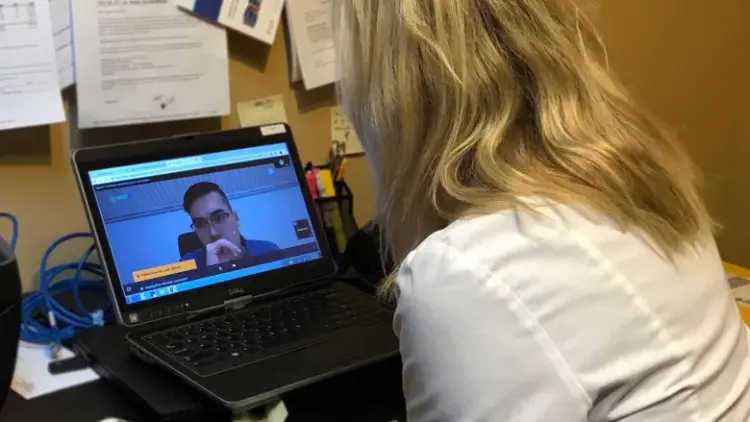Recently, dvm360's Chief Veterinary Officer, Adam Christman, had a video call to discuss the impact of COVID-19 on veterinary professionals, veterinary businesses, clients, and their pets. His guests were Dr. Scott Weese, professor of internal medicine, zoonotic disease, public health and microbiology at the University of Guelph Ontario Veterinary College, and Dr. Beth Davidow, clinical assistant professor of emergency and critical care at Washington State University College of Veterinary Medicine.
Here’s what they had to say.
(Source: [dvm360](https://www.dvm360.com/view/elucidating-the-consequences-of-covid-19-for-veterinary-practices "Elucidating The Consequences of COVID-19 for Veterinary Practices"))- Veterinarians are adapting to the new normal of social-distancing
- Determining what is elective vs. essential care is a challenge
- The veterinary community is coming together
Veterinarians Are Adapting to the New Normal of Social-Distancing
According to Dr. Weese, “From a veterinary context, we have to think about if there is potential for our patients to get infected, which is something we need to deal with from an infection control standpoint. Is there potential for our patients to get their haircoats contaminated and act as a fomite or mechanical vector?”
At present, the CDC says there is no evidence that “companion animals” can spread coronaviruses. Although some coronaviruses that infect animals can spread to humans, it is rare.
Still, the CDC recommends pet owners ensure their pets don’t interact with people and animals outside of the household:
- We do not have evidence that companion animals, including pets, can spread the virus that causes COVID-19 to people or that they might be a source of infection in the United States.
- CDC is aware of a very small number of pets outside the United States reportedexternal icon to be infected with the virus that causes COVID-19 after close contact with people with COVID-19.
- Treat pets as you would other human family members – do not let pets interact with people or animals outside the household. If a person inside the household becomes sick, isolate that person from everyone else, including pets.
- Further studies are needed to understand if and how different animals could be affected by the virus that causes COVID-19 as well as how this might affect human health.
Of course, the bigger question according to Weese is, “How do we work in veterinary medicine while social distancing?”
The pandemic and the subsequent state social distancing orders have required veterinary practices to change the way they do business. It has even affected veterinary schools. Veterinary students are now mostly learning online, which means they may miss important clinical rotations that are necessary for their education.
Veterinarians have also taken multiple measures to reduce human-to-human contact, including:
- Using telemedicine
- Accepting curbside patient admissions
- Maintaining less or no contact with pet owners
- Minimizing hand contact points, including handshakes and paperwork

Only accepting patients for essential care, not elective procedures Many of these measures have been implemented quickly and with little experience. But veterinary practices have rapidly assembled their own formulae for making it work.
Determining What is Elective Vs. Essential Care is a Challenge
Although most states have issued some guidance on what constitutes elective vs. essential veterinary care, there is still some confusion among veterinarians and their clients.
“It's a super complicated question,” says Dr. Davidow. “What if you have a pet who has cancer who needs chemotherapy? You're using PPE to treat those animals. I think many vets would say that's essential. But what if that pet has a very low likelihood of survival? What should we be doing in that situation?”
Veterinarians must also consider the human bond component — the fact that pets are a lifeline for humans during times of trauma and difficulty. Pets are essential to human well-being. Pet owners’ stress could be compounded if they learn their animal can’t be treated. Refusing treatment on the basis that the care is non-essential could become both an animal and a human welfare issue.
The Veterinary Community is Coming Together
Despite the challenges faced by veterinarians, both Dr. Weese and Dr. Davidow are encouraged by how the community is coming together in this time of crisis.
Animal hospitals that have unused ventilators on hand are donating them to human hospitals. Dr. Davidow and her colleagues even created a national database to help hospitals find available ventilators. All hospitals must do is fill out this Google form to search the database.
The Veterinary Information Network (VIN) also produced a resource for navigating COVID-19. The webpage contains everything from business advice and financial relief information to templates and client resources.
To help clients, their pets, and other veterinarians in your network, Dr. Weese suggests using a website or blog to publish information. “We’ve been putting out information on our blog about social distancing, elective vs. essential procedures, and how to admit animals.”
NOTE: To lend a hand, Pawlicy Advisor launched a different kind of COVID-19 HUB for veterinary practices that centralizes top resources from around the web, all in one place.
Information will be key to overcoming the challenges associated with this pandemic. With the right information in the right hands, the veterinary community can weather the storm.
